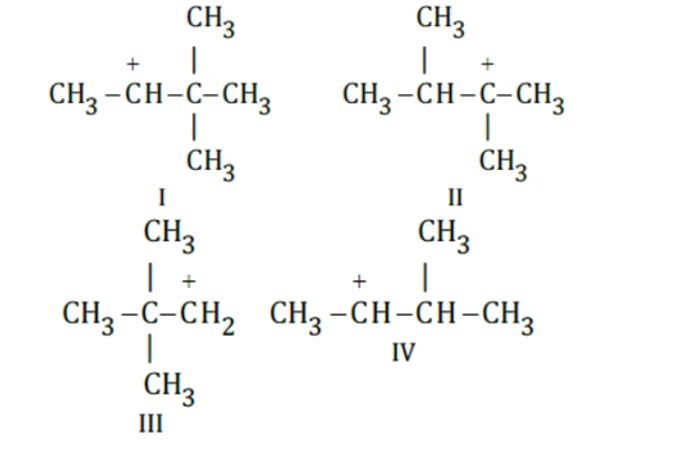Which carbocation is the most stabilized ?




The correct Answer is:C
To determine which carbocation is the most stabilized, we need to analyze the given carbocations based on their resonance and conjugation. Here's a step-by-step solution:
Step 1: Identify the Carbocations
Let's denote the four carbocations as follows:
1. Carbocation A
2. Carbocation B
3. Carbocation C
4. Carbocation D
Step 2: Analyze Resonance and Conjugation
Carbocations are stabilized by resonance. The more resonance structures a carbocation can have, the more stable it is. We will analyze each carbocation for the extent of conjugation.
Step 3: Evaluate Each Carbocation
- Carbocation A:
- Has limited resonance. Only a few adjacent atoms can stabilize the positive charge.
- Carbocation B:
- Slightly more resonance than A but still limited. The positive charge can be stabilized by neighboring atoms, but not extensively.
- Carbocation C:
- This carbocation has a significant number of resonance structures. The positive charge can be delocalized over several atoms, increasing stability.
- Carbocation D:
- Similar to C, but with fewer resonance structures compared to C. The extent of conjugation is not as high.
Step 4: Compare Stability
After evaluating the resonance structures:
- Carbocation C has the most extensive conjugation and resonance stabilization due to the ability to delocalize the positive charge over multiple atoms.
- Carbocation A and B have limited resonance, while D has slightly more than A and B but less than C.
Conclusion
Based on the analysis, Carbocation C is the most stabilized due to the highest extent of conjugation and resonance.
Final Answer
The most stabilized carbocation is Carbocation C.
---
Let's denote the four carbocations as follows:
1. Carbocation A
2. Carbocation B
3. Carbocation C
4. Carbocation D
Carbocations are stabilized by resonance. The more resonance structures a carbocation can have, the more stable it is. We will analyze each carbocation for the extent of conjugation.
- Carbocation A:
- Has limited resonance. Only a few adjacent atoms can stabilize the positive charge.
- Carbocation B:
- Slightly more resonance than A but still limited. The positive charge can be stabilized by neighboring atoms, but not extensively.
- This carbocation has a significant number of resonance structures. The positive charge can be delocalized over several atoms, increasing stability.
- Similar to C, but with fewer resonance structures compared to C. The extent of conjugation is not as high.
After evaluating the resonance structures:
- Carbocation C has the most extensive conjugation and resonance stabilization due to the ability to delocalize the positive charge over multiple atoms.
- Carbocation A and B have limited resonance, while D has slightly more than A and B but less than C.
Based on the analysis, Carbocation C is the most stabilized due to the highest extent of conjugation and resonance.
The most stabilized carbocation is Carbocation C.
Similar Questions
Knowledge Check
Which carbocation is the most stable ?
A B
B C
C D
D
Which carbocation is most stabilised among following?
A B
B C
C D
D
Which one amongst the following carbocations is most stable ?
A B
B C
C D
D
Which of the following carbocations is most stable ?
View SolutionWhich of the following carbocations is most stable ?

View SolutionWhich of the following carbocation is most stable?
View SolutionWhich of the following carbocation is most stable
View SolutionThe carbocation which is most stable is
View Solution
